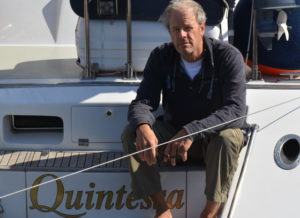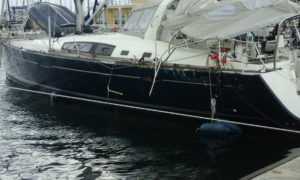September 8 – 11, 2017 —
It is Monday, September 11th, midnight. As I write these words the wind is gusting to 25 knots in the marina, and captains and owners have been showing up over the past couple of hours to put more lines on their boats. Everyone is probably still a little shell-shocked from Friday night. While today’s wind event is not forecast to amount to anything more than some heavy wind and chop, Quintessa, my Hylas 49, is still in the same slip which was so exposed during the ordeal of three nights ago. Although I am now safe, our situation is far from sound. The pontoon for the largest boats (15 to 18 meter) at Cleopatra marina here in Preveza, Greece is the furthest pontoon to the west, and the first pontoon the open sea smashes into from across the Adriatic, all the way from Italy.
Friday night, September 8th, was my second night back after a 48-hour, four-flight trip from Boston. It was to be my first good night of catch-up sleep. I was alone on the boat with my wife back in the states for another couple of months. I had just turned out the light at 2300 hours when I sat up to the noise of what sounded like a freight train coming from somewhere behind the boat. It couldn’t be a train, I thought, I must be hearing the engines of a large tanker coming through the inlet nearby. Within a few minutes the boat was shaking and I could hear the snapping sound of a head sail that was coming un-furled. It was at this point that I got out of bed assuming that it was my sail and I would have to deal with it. I climbed out the companionway, dressed only in my boxers, and was hit by the full force of waves crashing over the pontoon behind me, hitting the transom of the boat, ricocheting through the Textelene sun screen and producing a diffused spay all over the cockpit. Fortunately, is was not my headsail that was out of control; unfortunately, the seas were drenching everything in the cockpit with salt water—I decided I could deal with that in the morning.
Back below, I resigned myself to postponing sleep for a few more hours. I settled into the comforts of the main cabin thankful for the air conditioning on what was a hot sticky night. I figured I could monitor the storm from below, checking the internet and watching the wind speed, perhaps I would enjoy a cup of tea. I flipped on the wind instruments—30 knots, not bad.
When I peeled back the curtain on the starboard side and looked out the window I was alarmed to see the boat next to me surging an extreme amount. All the boats on the big boat quay were med-moored, tied stern-to the pontoon, and with heavy laid lines securing their bows to moorings in the fairway. Most of the med-moored boats were packed in tight, gunnel-to-gunnel. Only the boat’s collective fenders were keeping them apart. Fortunately, the starboard boat was one half a boat width away from me so we were not rubbing fenders. I was interested to note that not only was the boat surging more than Quintessa but occasionally it would get gyrating from side to side. This started to concern me because as it swung toward me it would stretch its lines to such an extent the stern would almost contact our fenders. I thought I should switch our largest ball fender to that side. Before heading out on deck, I decided to check the boat on our port side. First, I would look at the wind instrument again—50 knots! Oh boy!
As I peered from behind the curtain on the port side all I saw was a 50-foot boat being ripped from the dock and brushing past me in a matter of seconds. I had met the people on the boat earlier that evening. There were two couples and two children. My first thought was total disbelief, my second thought was those poor, terrified, people. I bounded to the deck, not knowing what I could do, only to see the boat smash into the bows of three or four other boats docked on the next pontoon over. I was horrified! At this point Quintessa was surging a lot too and I was having trouble keeping my footing. I looked at the pontoon we were tied to and it was convulsing like a carnival ride, with each of the 75-foot concrete sections responding to the adjacent sections it was linked to like an out of control train. We were taking tremendous waves every six to eight seconds with the boat surging as each wave hit. The garage bilge pump was running nearly continuously. Sometimes the boat and the dock would surge together, other times the boat would surge back while the dock was surging forward, missing the transom by less than a foot as the boat rose and fell by three or four feet. I thought, my God, I am going to be next. I have to do something. Wait, I need something else on. I dashed below to grab the first thing I could find—a light windbreaker. No time for pants or shoes. I glanced at the wind speed again—60 knots!! Holy Cow!
I scrambled back on deck and checked where the boat on my port side had been, nothing but parted lines and the shore power cord dancing in the water. I turned to look the other way, and there was no boat there either! I had boats on both sides of me just minutes ago, I was now all alone. How much longer would Quintessa last? I had to get more lines to the pontoon, but how? I crawled to the stern, barely able to hang on. First, I thought raise the pasarelle to the up position, it was barely clearing the pontoon when we surged back. Next, get out the biggest lines I had. But, who can I throw them to? If I was to save Quintessa, I would have to get off the boat. Bob, I said to myself, get the lines set, cleat them to the primary winches, run them clear of everything, coil them on the transom swim platform to throw, don’t screw up! If I jump to the dock, I will have one chance to get it right. There will be no getting back on board. I looked around, there was no one on the pontoon to help. Two more boats down the pontoon are breaking free at this moment. There would be no one coming to help. Everyone it trying to survive for themselves. No one will be coming out on the pontoon—it can barely be negotiated on foot. The gyrations will nearly knock someone over and the waves will wash them into the water. Another boat breaks free! Five boats, fifty feet and over have now been ripped off the dock and are piling up like matchsticks against the boats facing us. I am sure I will be the next boat to go. I have to get the extra lines to the pontoon. I have to crawl out to the end of the pasarelle and jump.
Bob, you have to throw the lines, wait for the timing to be just right, heave them hard to get them into the wind, don´t wait or the lines will get washed back into the water. Now! throw, jump. I land on the dock; I can’t believe I make it unhurt. I scramble to get the lines cleated. There are only eight boats left on the dock, including myself, I crawl along the dock to the other boats to see if I can help anyone. My power post is pulled over and shooting sparks. I thought, get the boat un plugged, get off the dock. I can see from the chaos on the pitching pontoon, Quintessa is happily ridding out this terrifying event. I can see the air conditioning water still flowing out and the lights on—despite the power being cut. Quintessa is doing just what she is supposed to: steadfastly providing comfort and safety to her passengers, unaware of the terror unfolding.
 Epilog: Quintessa never broke off the pontoon. After two hours, the storm was over and I returned to the boat, rattled but safe. In all six boats broke off the dock, two in the anchorage dragged anchor and collided. Fourteen boats damaged, four boats were not operational and had to be hauled out. One person taken to the hospital for a broken hand and lacerated fingers. A night to remember and lessons to be learned: Expect the unexpected, at all times. The forecast was for 25 knots.
Epilog: Quintessa never broke off the pontoon. After two hours, the storm was over and I returned to the boat, rattled but safe. In all six boats broke off the dock, two in the anchorage dragged anchor and collided. Fourteen boats damaged, four boats were not operational and had to be hauled out. One person taken to the hospital for a broken hand and lacerated fingers. A night to remember and lessons to be learned: Expect the unexpected, at all times. The forecast was for 25 knots.

